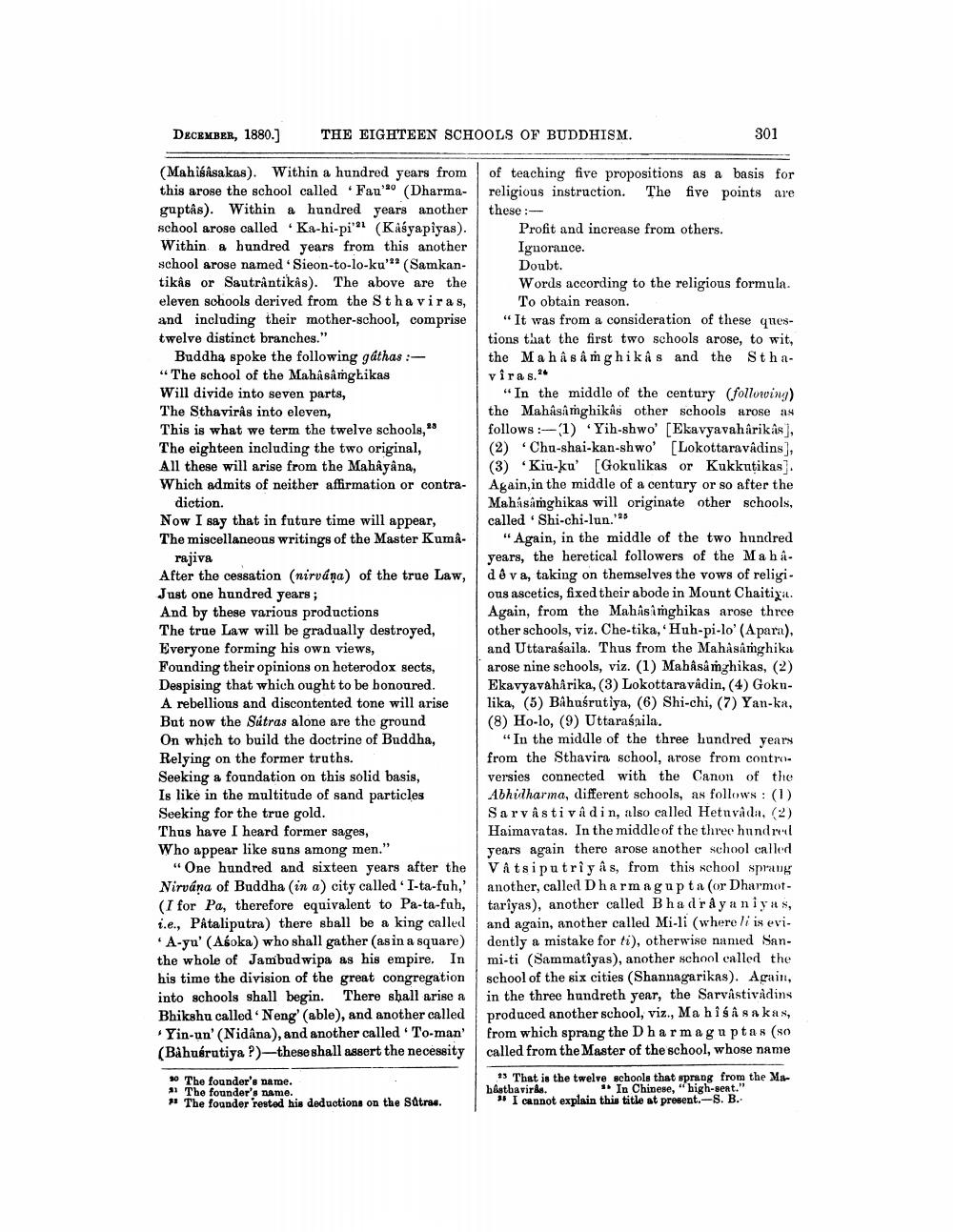________________
DECEMBER, 1880.)
THE EIGHTEEN SCHOOLS OF BUDDHISM.
301
(Mahisasakas). Within a hundred years from this arose the school called Fau'*' (Dharmaguptâs). Within a hundred years another school arose called Ka-hi-piot (Kaśyapiyas). Within a hundred years from this another school arose named Sieon-to-lo-ku'' (Samkan tiks or Sautrântikås). The above are the eleven schools derived from the Stha viras, and including their mother-school, comprise twelve distinct branches."
Buddha spoke the following gáthas :** The school of the Mahâsâmgkikas Will divide into seven parts, The Sthavirás into eleven, This is what we term the twelve schools, ** The eighteen including the two original, All these will arise from the Mahayana, Which admits of neither affirmation or contra
diction. Now I say that in future time will appear, The miscellaneous writings of the Master Kuma
rajiva After the cessation (nirvana) of the true Law, Just one hundred years ; And by these various productions The true Law will be gradually destroyed, Everyone forming his own views, Founding their opinions on heterodox sects, Despising that which ought to be honoured. A rebellious and discontented tone will arise But now the Sútras alone are the ground On which to build the doctrine of Buddha, Relying on the former truths. Seeking a foundation on this solid basis, Is like in the multitude of sand particles Seeking for the true gold. Thus have I heard former sages, Who appear like suns among men."
"One hundred and sixteen years after the Nirvana of Buddha (in a city called I-ta-fuh,' (I for Pa, therefore equivalent to Pa-ta-fuh, i.e., Pataliputra) there sball be a king called
A-yu' (Asoka) who shall gather (asin a square) the whole of Jambudwipa as his empire. In his time the division of the great congregation into schools shall begin. There shall arise a Bhikshu called Neng' (able), and another called
Yin-un' (Nidîna), and another called To-man' (Bihusrutiya ?)—these shall assert the necessity
of teaching five propositions as a basis for religious instruction. The five points are these: -
Profit and increase from others. Ignorance. Doubt. Words according to the religious formula.
To obtain reason. "It was from a consideration of these questions that the first two schools arose, to wit, the Ma h â sâm ghikâs and the Sthavira s.
"In the middle of the century (following) the Mahâsî mghikas other schools arose as follows : 1) Yih-shwo' [Ekavyavahårikås, (2) Chu-shai-kan-shwo' (Lokottaravadins), (3) Kiu-ku' [Gokulikas or Kukkutikas). Again, in the middle of a century or so after the Mahasanghikas will originate other schools, called Shi-chi-lun.95
"Again, in the middle of the two hundred years, the heretical followers of the Mahad 8 va, taking on themselves the vows of religi. ous ascetics, fixed their abode in Mount Chaitiya. Again, from the Mahasimghikas arose three other schools, viz. Che-tika, Huh-pi-lo' (Apara), and Uttarasaila. Thus from the Mahasanghika arose nine schools, viz. (1) Mabåså mghikas, (2) Ekavyavaharika, (3) Lokottara vadin, (4) Gokulika, (5) Bahuśrutiya, (6) Shi-chi, (7) Yan-ka, (8) Ho-lo, (9) Uttarasaila.
"In the middle of the three hundred years from the Sthavira school, arose from controversies connected with the Canon of the Abhidharma, different schools, as follows: (1) Sarvâstiva din, also called Hetuvada, (2) Haimavatas. In the middle of the three hundrell years again there arose another school called Vätsiputrîyâ s, from this school sprang another, called Dharmag upta (or Dharmottariyas), another called Bhadra y a niyas, and again, another called Mi-li (where li is evi. dently a mistake for ti), otherwise named Sanmi-ti (Sammatiyas), another school called the school of the six cities (Shannagarikas). Again, in the three hundreth year, the Sarvastividins produced another school, viz., Ma hissakas, from which sprang the Dharmaguptas (so called from the Master of the school, whose name
*5 That is the twelve schools that sprang from the Mheathaviras.
In Chinese, "high-seat." " I cannot explain this title at present.-S. B..
10 The founder's name. 31 The founder's name. 31 The founder rested his deductions on the Sätras.




